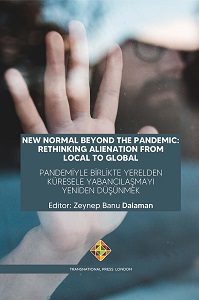Mapping Alienation, Intimacy and Loneliness onto Cinematic Existence
Mapping Alienation, Intimacy and Loneliness onto Cinematic Existence
Author(s): Sweta Kushwaha
Subject(s): Rural and urban sociology, Film / Cinema / Cinematography
Published by: Transnational Press London
Keywords: alienation; urbanization; post-modern; intimacy; love; home;
Summary/Abstract: The paper will be exploring the city of Istanbul and Tokyo as an entity, an existence that embodies the post-modern, alienated, and urban existence of the protagonists in the Turkish drama Fazilet Hanim ve Kizleri (Saraçoğlu 2017) and the Japanese film The Tokyo Night Sky is the Densest Shade of Blue (Ishii 2018). The navigation of the city and the home by the protagonists in these works are studied within the paper through the lens of urban theory and psychology to articulate their fragmentary urban experiences and the brief glimpses of intimacy within these texts. These texts are studied for the entrapment the characters feel, the claustrophobia of the urbanity of a city that has no place for vulnerable, human relationships and love. They are also studied against the background of the parental alienation the protagonists have faced and continue to feel in their life which contributes to their loneliness. Romantic love is studied as a revolutionary force and captures the “moments” theorized by Henri Lefebvre that is a response to the post-modern fragmentation and which reaffirms human existence. The domestic space of the house is theorized as a space of possibilities and human condition. So, while the space of the city often has negative connotations, the positive spaces like home and the streets are also studied to give voice to the urban experience of living in these cities.
Book: New Normal Beyond The Pandemic: Pandemiyle Birlikte Yerelden Küresele Yabancılaşmayı Yeniden
- Page Range: 357-371
- Page Count: 15
- Publication Year: 2021
- Language: English
- Content File-PDF

